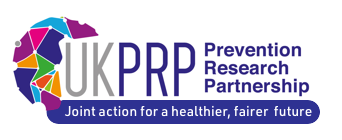Call 2 – Network
1. Aims of Network Awards
The main objective of the Network Awards is to create new interdisciplinary communities around broad challenges in the primary prevention of non-communicable diseases (NCDs) that are aligned with the UKPRP vision and objectives. The award will enable interactions between diverse academic disciplines and users, which include policy makers, practitioners, civil society groups, the public and industry, to draw together expertise and perspectives for generating fresh insights on how best to address challenges in the primary prevention of NCDs.
This award will:
- enable the transfer of research techniques, for example experimental techniques, models and scientific insights across disciplines in pursuit of new approaches to primary prevention research on NCDs.
- promote mobility of expertise between network members that builds capacity and capability in the UK to undertake research into completely novel approaches to preventing NCDs.
- support networking long enough for a group comprising different disciplines and sectors to build a shared language and vision and to agree goals that all members of the network will want to reach.
While a small proportion of the grant can be used to pump prime new research collaborations, applicants should note that the funding provided is not for primary research.
UKPRP networks will have visionary leadership and core membership which have a strong drive to build a diverse community with a broad range of research expertise, drawn from across numerous, and relevant disciplines, and from non-academic sectors. This can also include those working in the prevention arena that do not primarily have a health focus. The network lead must implement appropriate mechanisms for developing the membership of the network – we encourage applicants to be creative in their approach and expect this should extend beyond meetings and workshops.
Ultimately, the UKPRP funding for networks will develop future capacity in the UK to address NCD prevention challenges. We expect networks will be positioned to apply for funding to lead new collaborative interdisciplinary and cross-sectoral research proposals as they would have developed the critical mass of expertise that can be brought to bear on NCD prevention challenges.
2. Network Award Application Process
There will be a two-stage process for applications for Network Awards:
(i) Outline application
Applicants are required to submit a detailed outline proposal through the Joint Electronic Submission (Je-S) system by 16:00 (GMT) on 14 November 2019. You must notify the UKPRP Secretariat of your intention to submit an outline proposal and the topic area of interest by 18 October 2019. The purpose of the outline application is to ascertain the potential of the planned network to fulfil the UKPRP objectives. The accompanying Network Award application guidance (PDF, 139KB) provides details on the expected content for each section in Je-S and the Case for Support form which we have supplied. You must complete and upload the form to Je-S as part of the outline proposal. You should refer to the Frequently Asked Questions document (PDF, 185KB) which provides answers to common queries.
(ii) Full application
Guidance for the full application stage for Network Awards will be made available to successful outline applicants, who will receive a six-month period to develop the vision and plans for their network as they prepare full proposals. During this period, applicants are expected to respond to the feedback received from the international Expert Review Group (ERG) Panel that evaluated outline proposals. Feedback may include the need to reach out to other academic disciplines and embed users in the initial/core network membership. Applicants will also be required to attend a Joint Applicant Meeting (JAM) which aims to bring together all successful outline applicants to discuss key areas they will need to develop in their application.
All full proposals must be completed and submitted through the Je-S system. All applications need to be submitted through the lead Research Organisation (RO) which in turn must be Je-S registered. Applicants will be provided with written feedback from the peer review of full applications and should submit a written response to the peer review comments which will be considered by the ERG Panel.
Applicants may be the Principal Investigator on only one application for a network award. However, individuals can act as Co-Investigators on any number of applications. Please note that the assessment will consider the level of engagement of Co-Investigators with the networks and their capacity to meet these requirements.
3. Funding Available
Under the first funding call, the UKPRP funders invested over £1 million in four UKPRP networks. Details of the networks funded under the first call are available under What we fund. Via this second round, we hope to establish up to four additional networks, provided that they meet the vision for UKPRP networks and the scope of this call. Applicants are now invited to submit outline proposals to form UKPRP networks according to the scope of this second call.
Each network will be supported by £100k per annum for a duration of up to 48 months. Each award will fund the operating and supporting costs of the UKPRP network as well some limited pump-priming. Requests for funding may include:
Investigators’ salaries
The Principal Investigator and Co-Investigators who can request funds to cover their salary costs for the time spent on setting up and managing the network. Time spent by the Principal Investigator and Co-Investigators on the co-ordination of the network should be reasonable and is not expected to form the majority of the cost of the proposal. The salary costs of network participants should not be included in the proposal and we would not expect these individuals to be Co-Investigators.
Travel and subsistence
Travel and subsistence enabling members of a network to meet to exchange ideas and expertise. This may include visits by or to experts overseas. Industry collaborators should meet their own travel costs.
Administrative support
Funding for administrative support can be requested to help in the co-ordination of a network. Costs should be reasonable and ideally only form a small part of the request for funding. Reasonable costs for monitoring and dissemination of a network’s output can also be included.
Organisation of activities
Funding can be requested for costs involved in running activities such as networking events, expert working groups, debates, online discussion forums, lectures, seminars, short term people placements or exchanges, problem solving and workshops, skills training etc. Applicants are encouraged to think creatively about the range of activities that could support the delivery of a network’s goals.
A limited amount of the overall cost could be allocated to some feasibility research to help cement a collaboration or to underpin further work to help the case for a grant application. For example, discipline hopping, feasibility studies, proof of concept. Funding can help to purchase a small amount of consumables, travel and subsistence related to this activity. Activities are expected to be open to the wider community i.e. beyond the network membership.
The National Institute for Health Research (NIHR) is one of the UKPRP funders. During the full application stage, we encourage applicants to contact a Local Clinical Research Network (LCRN) early on so the LCRN can advise what services they may be able to provide to support the success of your proposed work (including pump priming) if it receives UKPRP funding. These local networks coordinate and support the delivery of research in the NHS and across the wider health and social care environment, in England. This means that the CRN is now able to support a wide range of population health and prevention research, including studies that use many different methods and take place across a range of settings. Details of the range of support available and contacts for each of the LCRNs are set out on the NIHR website.
Similar support is available in Scotland through the NHS Research Scotland Clinical Research Networks and Specialty Groups; in Wales through Health and Care Research Wales (HCRW); and in Northern Ireland through the Northern Ireland Clinical Research Network (NICRN). In addition, support for recruitment to health research studies in Scotland is available through Scottish Health Research Register (SHARE) – a Scottish register of over 250,000 people who are interested in participating in health research studies and have agreed to searches of data in their medical records to see if they match study inclusion and exclusion criteria and to be contacted about such studies.
A proactive and enthusiastic network leader/leadership team is an essential component of a successful network. It is expected that networks will grow over the period of the award and should be inclusive and open. Networks should therefore also have web and social networking presence.
4. Assessment Process and Criteria
Applications will be assessed by the UKPRP’s ERG comprised of senior independent academics from the UK and overseas, and user representatives. The Group’s expertise will reflect the breadth of disciplines involved in the networks. The ERG will feedback to the applicants and the funders, and might advise on how to better mould and/or rationalise the bids, especially where approaches to making linkages could be stronger.
Please note also that the details of successful outline proposals will be published on websites, including UK Research and Innovation (UKRI) UK Gateway to Research, to provide an opportunity for additional groups with complementary skills, expertise or resources to contact the Principal Investigator.
Assessment criteria for outline network applications
Applicants should consider carefully the following criteria which will be taken into account by the ERG when assessing proposals:
Leadership, management and membership of the network
- the suitability of the core management team – the strength of the proposed network and the range of expertise of the initial members.
- the effectiveness of the proposed management structure and plans.
- the plans for wider engagement (academics, users etc.) – mechanism for widening the participation and collaboration with other relevant disciplines and interactions with international leaders in the field as well as linkages to non-academic sectors.
Purpose of the network
- the fit to the aims of UKPRP.
- how novel the network is (its disciplinary mix and/or the topic/questions to be addressed) and whether it brings together disciplines and actors that may not normally be involved in prevention research.
- the contribution the network will make towards addressing the prevention research challenge.
- the potential of the network to generate novel, high quality activities that will advance thinking in its chosen area.
- network activities – the extent to which the planned activities allow the generation of ideas, wider engagement and implementation of plans to address the needs of prevention research.
Impact and wider applicability
- the existence of clearly thought through and acceptable pathways to impact.
- the appropriateness of engagement plans with users to accelerate impact.
- the appropriateness of communication and knowledge exchange plans.
Resources requested
- the appropriateness of the requested resources for the proposed activity of the network.
- the appropriateness of plans for the management of the feasibility funds and how decisions on its allocation will be reviewed by the network.
- the sustainability of the network after the lifetime of the grant.
5. Key Dates
| Stage | Date |
|---|---|
| Launch of second funding round | 3 September 2019 |
| Deadline for notification of intention submit a proposal | 18 October 2019 |
| Closing date for outline applications | 14 November 2019 |
| Outline applications assessed by Panel | February 2020 |
| Outline applicant notified of decision | March 2020 |
| Joint Applicant Webinar (for those invited to submit full applications) | May 2020 |
| Closing date for full applications | December 2020 |
| Full applications assessed by Panel | April 2021 |
6. Contact
If you have a query about your proposal, please email the UKPRP Secretariat












